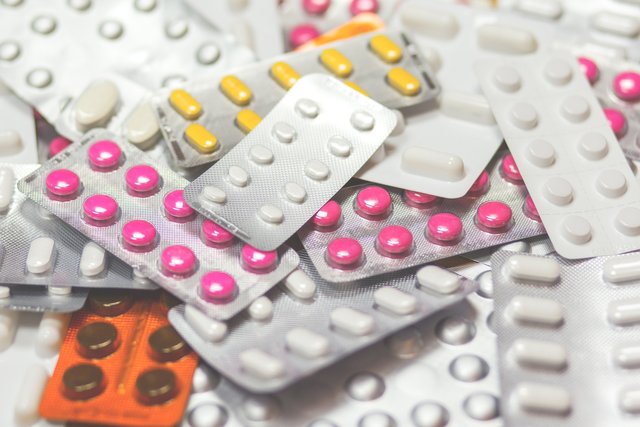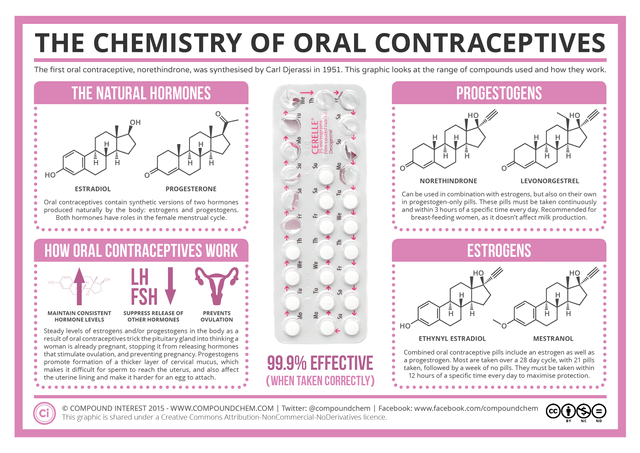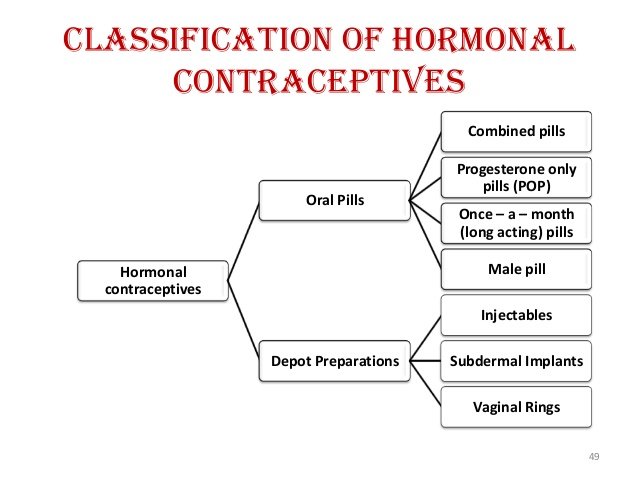UNDERSTANDING ORAL CONTRACEPTIVE PILLS.
Background
The contraceptive pill, also known as birth control pill, is widely used all over the world.This is because it is cheap, easily available and simple to use.Though it is widely used, not everyone is familiar with its side effects or say not everyone is familiar with their menstrual cycle.so, the main objective of today's article is to make all steemians( of course male too ) familiar with every aspect of the contraceptive pill.
The mechanism of action of the contraceptive pill is based on the physiological process of menstruation.So, before dealing with the side effects or physiological basis of contraceptive pill its is mandatory to know (at least something ) about the menstrual cycle.

source
MENSTRUAL CYCLE
menstruation is the visible manifestation of cyclic physiologic uterine bleeding due to the shedding of the endometrium(the innermost layer of the uterus).This is due to invisible interplay of hormones mainly through the hypothalamic-pituitary-ovarian axis.

The period extending from the beginning of one cycle to next is called menstrual cycle.The first Menstrual cycle (called menarche) usually begin at 11 to 15 years.Once it starts, it continues cyclically at interval 21 to 35days.Menopause ( stoppage of menstrual cycle) occurs at the age of 45 to 50 years.A menstrual cycle consists of uterine and ovarian changes which occur side by side.A uterine change consists of three phase i.e bleeding phase, proliferative phase and secretory phase whereas ovarian phase consists of menstrual phase, follicular phase(corresponds to proliferative phase)and luteal phase(corresponds to secretory phase)

Bleeding phase lasts for about 4 to 5 day.The Average amount of blood loss is 20 to 80 ml.The 70% of total blood loss occurs in the first 2 days.
The menstrual discharge usually consists of blood, mucus secreted from a gland, vaginal and cervical epithelium, cells of endometrium , enzymes and hormones.

After the completion of bleeding phase, proliferative phase or follicular phase starts.The proliferative phase extends from 5th or 6th day to 14th day.As the name suggests, during this phase there is proliferation(multiplication) of glands, epithelial lining and blood vessels.The glands become tubular.Epithelial cells become columnar with nucleus situated at the base.Stromal cells becomes spindle shaped.And spiral vessels extend below epithelium.During this phase thickness of endometrium measures about 10 to 12 mm.
Secretory phase is basically a phase for implantation of the fertilized embryo.Blood vessel undergoes marked spiraling.The stromal cells become swollen and large.The thickness of endometrium remains its highest i.e 12mm
This is all about the uterine phase.
Now we will be dealing in brief about ovarian cycle(it occurs simultaneously with uterine phase).
Follicular phase is the first phase of ovarian cycle.The ovarian follicles (say egg) develops and starts to mature.Fully mature follicle is called graffian follicle.It measures about 20mm.
The next phase is called ovulation phase.The graffian follicles reach the surface of the ovary.It contains oocytes( which later fuses with the sperm).During ovulation stage, oocytes is released from the graffian follicles.This occurs on the 14th day of regular cycle of 28 days.
After the ovulation,the ruptured follicle is filled with blood.Later the cells in follicle proliferate and become mature which is called corpus luteum.
This is all about the mechanical changes in uterus and ovary.Before really understanding the mechanism of contraceptive pills, we have to know the interplay of hormones.Well, I have already mentioned about the hypothalamic-pituitary-ovarian axis.
Hypothalamus releases gonadotropin releasing hormone(GnRH).This hormone acts on pituitary gland which then releases Follicular stimulating hormone (FSH) and Lueitinizing hormone (LH).The function of FSH is to help in the development and maturation of ovarian follicles.

FSH acts on follicle to release estrogen.This estrogen helps in the proliferation of endometrium and also helps in ovulation.Estrogen maintain the negative feedback mechanism i.e when the level of estrogen is high it will decrease the level of GnRH and FSH (& LH).Nearly 83 hours before ovulation, the level of estrogen rises drastically.This leads to the onset of LH surge.After 32 to 36 hours of LH surge, ovulation occurs.

The above diagram clearly explains the interplay of hormones during different stages.During the follicular phase or proliferation phase, the level of FSH is high.This acts on the follicle and releases estrogen.so the level of estrogen is also high.This estrogen helps in the proliferation of endometrium.Before 24 to 36 hour of ovulation, estrogen riches to the peak level.so the level of FSH starts decreasing( negative feedback mechanism) but LH surge occurs.Due to LH surge,there is ovulation.During follicular phase the level of progesterone is low ( is in the baseline).
During the Luteal phase (or Secretory phase ) the level of progesterone is high.This helps in maintaining the pregnancy.Progesterone is secreted from corpus luteum.Corpus luteum can survive up to 12 to 14 days.Thereafter placenta plays the same role.In case if pregnancy has not occured,the corpus luteum will regress and the level of progesterone will fall drastically.Due to low level of progesterone, uterus cannot maintain the suitable environment and thus shedding of endometrium occur.
ORAL CONTRACEPTIVE PILLS
Introduction:-
At this point of time it is needless to say it is widely used form of contraception.Among various form of contraception, it is easier to use.Oral contraceptive pill contains hormone(s) that we have already discussed i.e Estrogen or Progesterone or Both.

contraceptive pill comparison
Types:
Mainly there are four types of oral pill-
- Combined pill-contains both estrogen and progesterone
- Progesterone containing pill
- Emergency pill
- once a month pill

classification of hormonal contraceptive
Above mentioned pill contain either estrogen or progesterone.So, it is better to discuss their mode of action as a wholesome rather than discussing individually.
Mode of Action
ESTROGEN- it inhibits FSH rise by negative feedback mechanism ( as already discussed).As the FSH level is decreased the follicular growth is hampered.So, egg can not mature.
PROGESTERONE-It inhibits the LH surge.so, ovulation cannot occur. It also makes the cervical mucus thick so that sperm cannot enter.Most importantly it counteracts the adverse effect of estrogen i.e endometrial hyperplasia.
INHIBITION OF OVULATION-
Both the hormone synergistically acts on hypothalomopituitary axis.Due to this the secretion of GnRH , FSH and LH is decreased or suppressed Which inhibits the ovulation.
Due to hormonal action, there is a regression of gland which makes endometrium non receptive to the embryo.
Let's not discuss the dose and schedule of the oral contraceptive pill.Someday we will discuss this in detail.For now, the most important topic is to know about the various side effects of oral contraceptive pills which your doctor might not have told you.
Minor Complications
Most patients experience nausea, vomiting, headache and leg cramp.They are not severe enough to hamper daily activities.Breast tenderness, acne, chloasma, weight gain can cosmetically disturb lifestyles/personality.Menstrual abnormalities are common among pills user.They experience breakthrough bleeding(which can be troublesome), amenorrhea(absence of menstrual cycle), menorrhagia (heavy menstrual bleeding). All these menstrual abnormalities surely make you visit your doctor.
Major Complication
- Hypertension:-Low dose pill rarely cause hypertension.Pre-existing hypertension may aggravate.it usually reverses to normal at 3-6 months.
- Vascular complication:-It includes venous and arterial thrombosis.This increases the risk of myocardial infarction and stroke.people with hypertension, smoking, diabetes ,obesity, thrombophilias should not use pills.They are at high risk of cardiovascular disease.
- Jaundice:-woman with the previous history of jaundice in pregnancy and hepatitis are at high risk.
- Estrogen pill increases the risk of developing breast carcinoma and endometrial carcinoma but combined pill reduces the risk by 50%.
Contraindication of pills
- RELATIVE CONTRAINDICATION:-
it includes age more than 40 years, smoker, history of jaundice, mild hypertension, diabetes, gallbladder disease, sickle cell anemia, headache, cancer of cervix, vaginal bleeding, post breast cancer.
Woman can take pill but the risk of developing complications are high.So, it is better to consult a doctor.
- ABSOLUTE CONTRAINDICATION:-
heart disease, severe hypertension, history of stroke, diabetes with complication, migraine, disease of liver,estrogen dependent neoplasm
References
- A textbook of gynecology by DC Dutta 7th edition.
- https://en.wikipedia.org/wiki/Combined_oral_contraceptive_pill
- https://www.cdc.gov/mmwr/preview/mmwrhtml/00001216.htm
- https://www.ncbi.nlm.nih.gov/pubmed/1873443
images
The image source is linked below every image and most are labeled to re-use.No copyright infringement is intended.
Thanks for reading.
Any feedback and comments are highly welcome !
DON'T FORGET TO RESTEEM, FOLLOW AND UPVOTE

You got a 0.97% upvote from @postpromoter courtesy of @alpharay!
Want to promote your posts too? Check out the Steem Bot Tracker website for more info. If you would like to support the development of @postpromoter and the bot tracker please vote for @yabapmatt for witness!